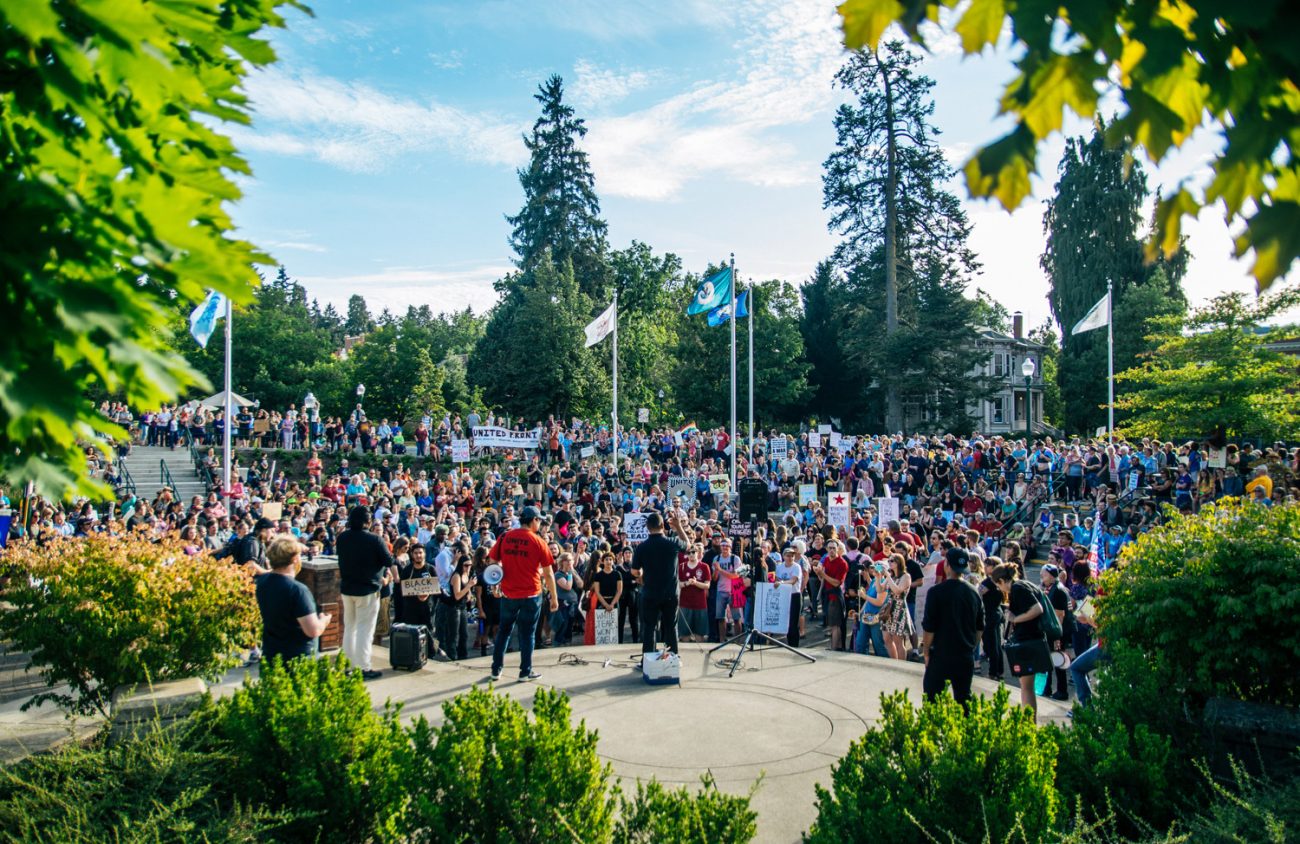“This is a call to action to show that we will do what’s necessary to protect our people,” said Charlie Landeros, an organizer of Monday’s “Hate Is Not Welcome in Lane County” rally. Unlike events like the Women’s March and rallies against President Trump’s Muslim ban, the march and rally focused less on unity and more on standing apart from white supremacy and in solidarity with marginalized people.
“We’re setting the terms for what it means to be an ally,” Landeros said of the Aug. 14 rally. He told EW there is a pervasive and persistent “polite racism” that continues in the community that must be called out.
“You can’t just claim to be an ally,” Landeros added. “That’s on the terms of the people you claim to support.”
“This isn’t about what is comfortable,” said local labor leader Phil Carrasco, another of the event’s organizers. “White fragility isn’t going to save or change anybody.”
The rally and march were in response to the events at Charlottesville last weekend where violent clashes broke out between white supremacists and counter-protesters. At the event a car that appears to have intentionally targeted the protestors killed Heather Heyer and injured 19 others. When she died her Facebook page bore the quote: “If you’re not outraged, you’re not paying attention.”
While the Eugene event was peaceful — only one man disrupted the marchers, waving a Trump-Pence campaign sign — the tone of the event was not kumbaya.
Speakers challenged event-goers to move beyond rallies and hashtags and to engage with members of their community on an everyday basis. And the persistent and often overlooked racism in Eugene was repeatedly called out.
At the start of the march, organizers made a point to direct alter-abled participants and families with children to the front to set the pace. Participants ran the full spectrum of age, gender identity, race, religion and ethnicity.
Speaking to at least 500 people gathered at the Park Blocks, Naomi Strawser, an Alaskan Tlingit Native, said most people don’t know Eugene and Lane County’s racist history. “The memories and practices of excluding people of color remain,” she said. “The last sign that read no niggers and no dogs in Lane County came down in the ’90s.”
Total participation in the rally and march has been estimated to be as high as 1,500. The march extended through at least four city blocks as it moved from the University of Oregon’s EMU amphitheater to the Park Blocks.
“People of color know how dangerous this town is,” Strawser said. “Known neo-Nazis live comfortably within our boundaries, free to openly recruit, hate and target us.”
“Silence is consent,” she said.
Alex Aguilar is a senior at Gateways High School and media coordinator for Citywide MEChA, a primarily Latinx group educating youth leaders. He said that the rally was about protecting people in Lane County and sending a larger message nationwide. “After what we saw in Charlottesville, Virginia, it’s important that we step up in these situations and not let it be normalized in a community here in Oregon.”
Aguilar said that lately he’s been the object of racist comments he hadn’t experienced before the rise of Trump. “A lot of white supremacists are feeling more open about it,” he said, “I feel like they think, ‘Well, since Trump is my president I feel more protected.’”
“As a black man in Eugene, it’s very important I stand up for my people,” said Nathan Jones, a native of Eugene who was attending his first demonstration. “I’ve seen things change in the past year or so.”
He said, “No matter your race, color or creed we need to stand up together and stop this. We need to stand up to fascism in this country.”
“This is a country built on immigration and we need to keep it that way,” Jones said.
Speaking in front of the gathered demonstrators, Kris Ray called on the crowd to engage in difficult conversations in the community and at home. “Take it back to the dinner table, take it to the coffee shop, take it to the family function, make everybody uncomfortable,” she said.
Joann Hoffman, who attended the event with her daughter and two of her daughter’s friends, said she tries to contribute beyond rallies by making calls to lawmakers and supporting causes like the ACLU and Anti-Defamation League. “I feel like we’ve been doing it for years and just when it feels like we’re moving forward in evolution something like this happens,” Hoffman said.
According to organizers, the Lane County Defense Network and Redneck Revolt provided security for the event because some of the attendees and speakers weren’t comfortable with the idea of a police presence. Eugene police did clear roads ahead of the march and kept watch from a distance.
The Eugene Chapter of Democratic Socialists, the Graduate Teaching Fellows Federation, Indivisible Eugene, 350 Eugene and CityWide MEChA were all represented at the event. No local politicians or University of Oregon leaders spoke or made public appearances at the rallies.
